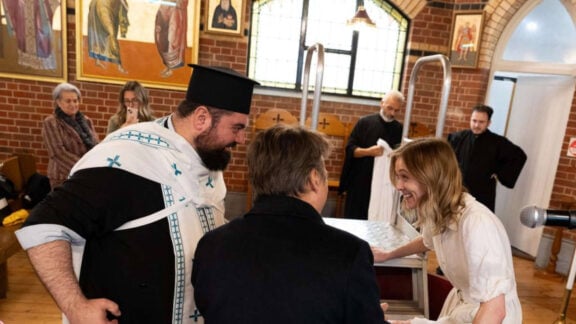Ancient Greek and Latin are forming part of a wider rebirth in ancient language studies at university level, with interest coming locally and internationally, including east Asia.
Statistically, students studying Ancient Greek have increased by 49 per cent at the University of Melbourne since 2010, and with 71 students studying classics, the university is bridging the East-West gap.
Dr Hyun Jin Kim, from the University of Melbourne’s School of Historical and Philosophical studies, was born in Seoul, Korea, and grew up in Auckland, New Zealand, before making Melbourne his home and furthering his studies and expertise in Ancient Greek.
His love of the classics and history formed through the legacy of his father, who moved his family to New Zealand to study ancient Greece.
Dr Kim now teaches the language and says numbers have been increasing steadily, peaking at 71 in 2014.
“Our ancient world studies program has been booming in recent years. The number of students in Ancient Greek and Latin has been consistent. It fluctuates over time but in recent years it has been very consistent and also showing signs of growth so, it’s pretty positive I think.”
He believes both Ancient Greek and Latin extend beyond their influences on founding western civilisation, by stretching to the far eastern corners of Asia.
“If you look at Buddhist sculpture, we would think of that as quintessentially Asian, that it is the soul of Asia. Actually the art form derives from the mixing of Greco-Bactrian art. And there are many, many other things that we could claim goes back to Greeks as well – modern democracy, which has a home not just in the west but also in the east.”
“The political language we use and also a lot of the quintessential features of civilisation go back to ancient Greece, so knowing the language allows you to enter into that culture and also interact with that culture much more effectively.”
Accordingly, fluency in Modern Greek produces an immediate intimacy with the Greek culture, but Ancient Greek, he says, provides a deeper understanding of the origins of Hellenism and modern societal structures.
Despite their distinction, Dr Kim says the two languages are surprisingly similar, with differences found in pronunciation, phonetics and syntax.
“Greek culture and language and civilisation has remained relatively intact, and of course the introduction of Christianity and the Christianisation of the Roman Empire in late antiquity, and later the birth of the distinct Greek Orthodox tradition, had a huge impact; that is the real cultural break between ancient Greece and modern Greece.
“If you want to understand modern Greece of course, ancient Greece is fundamental, but you cannot neglect the Byzantine period either.”
One of Dr Kim’s students, Alex Arvanitis, whose father heralds from Lefkada, and his mother from Italy, has been studying Ancient Greek since he was a student in primary school, and has just completed three years at university, with plans to continue at a post-graduate level. He agrees with Dr Kim’s summation of the evolution and distinction of the two forms of Greek.
“When I was young I’d been to Greece and I had been to all these sites and it conjured a natural curiosity in me, and of course being of Greek descent I had a natural disposition to know about my ancestry. It’s important to say that being of Greek descent, it’s the thing that gives you the initial interest to study it, but to continue studying takes a lot of discipline and you can’t just be in it for nationalistic purposes, but that is an important part.”
For him the appeal was much more than just a cultural lesson, it was, he says, a study of the fundamental principles that form part of his culture and much of modern society.
“The appeal is that you’re getting to the root of the culture. You get a sense that you can get cut off from the source of Greek or Italian culture because what we have now is a subculture from our grandparents’ generation and once they pass away it’s something that’s going to be lost along the way. Sure you can learn the modern language or you can learn the food or the music but that’s not getting to the core of the culture, there’s more to the Greek and Italian cultures than food or music, and if you maintain a knowledge and you have an appreciation of the ancient cultures that’s something that is at the core of the understanding.”
Despite his extensive knowledge, because Alex’s second language does not conform with the mainstream, his source of maintenance comes through studying and translations. The language course, he says, is structured in a way to preserve that understanding.
And it is a widespread historical respect for Greek customs and culture that both Alex and Dr Kim emphasise as the reason the language has survived many thousands of years, and many conquests, including the Ottoman Empire.
“I think Greek culture was very fortunate in a sense because it was respected. When the Romans conquered the Greeks, they were basically conquered by the Greeks, culturally speaking. Roman culture was Hellenised and the Romans absolutely loved Greek literature, they helped preserve it, they helped spread it, and of course the same thing happened in the east as well. For example the Kushans, an inner-Asian empire that conquered the Greco-Bactrian Kingdom, didn’t destroy Greek culture. They used Greek as part of their written medium and they helped spread a lot of the Hellenic culture into China and India. Those who overpowered the Greeks militarily were overwhelmed culturally, so it was preserved by antiquity and late antiquity,” Dr Kim says.
He also believes Greeks had an immense impact on the Ottomans as well. Architecturally, he names prominent buildings such as the Blue Mosque in Constantinople- Istanbul, and the Mosque of Suleiman the Magnificent as inherently Hellenic influenced.
“The administration of the Empire, its art and architecture, it is Byzantine, in fact you could say the 600 years of history was to an extent a continuation of the Byzantine empire, culturally speaking. Look at the location of the capital, it’s the same, and if you look at the territory controlled by the Ottomans, it was the territory controlled by Justinian, it’s just that the religion and one ruling elite had displaced another ruling elite. But then again if you look at the Turkish Pashas, the Grand Viziers, many of them were Greek. They’re Greeks who were integrated into the Ottoman system, like Sinan Pasha who built the mosques in Istanbul – he was almost certainly of Greek ancestry.”
Dr Kim says Greece’s geographical location, in the centre of Asia and Europe, has given it the breadth for its culture to flourish on both continents, from the furthest corners of Spain to those in China.
Dr Kim has authored two books, the first on Greek and Chinese ethnography and the second on the Huns and the fall of the Western Roman Empire.









